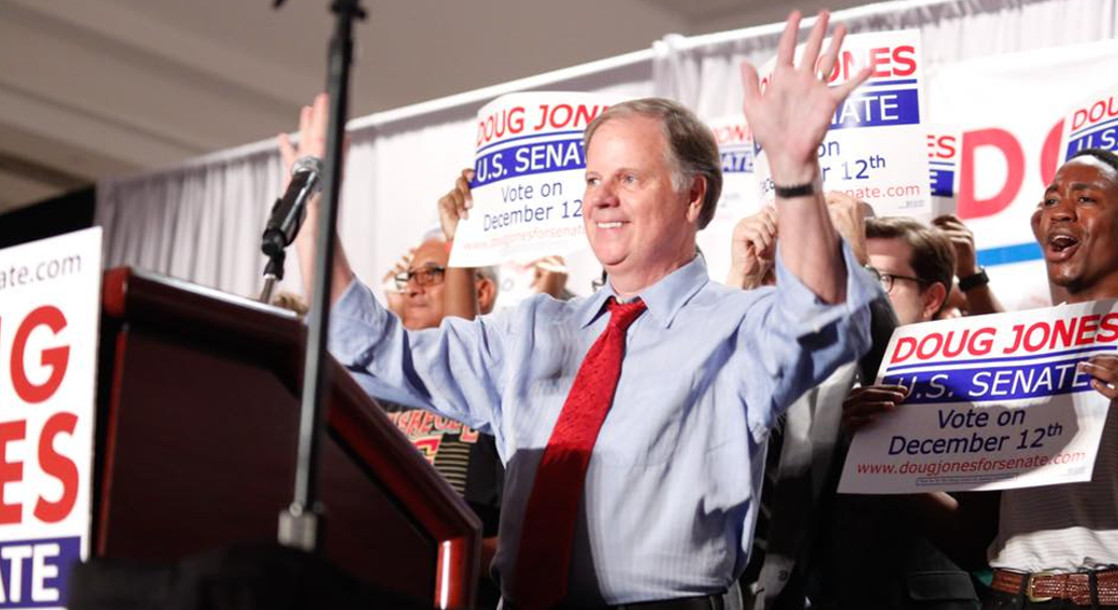Photo via Doug Jones for Senate
Here at MERRY JANE we’re convinced that the world revolves around cannabis. From politics to culture, civil rights to economics, you can find keef dusted across every facet of modern life. But in these increasingly divided times, where natural disasters go damn-near ignored for two months and Twitter fingers have almost literally become trigger fingers, it's become increasingly important to highlight the most pressing news outside of the cannabis space. In a weekly round-up MERRY JANE will break down the stories making waves in media, politics, technology, and culture — keeping you up to date on what’s making our world tick. Here's what you Need To Know.
Ever since President Donald Trump tapped Jeff Sessions to leave his spot in the Senate to assume the role of U.S. Attorney General, Sessions’ former Senate seat has represented much more than just a vote on Capitol Hill, even as that vote threatens to tip the scales on incredibly significant tax and health care legislation.
When Alabama voters took to the polls and elected Doug Jones to the Senate yesterday, they also spoke for much of the nation, drawing a line in the sand and rejecting the idea that partisan politics is a game played without boundaries.
To break down why Alabamians had the option to vote for an alleged sexual predator in the first place, what factors lead to Jones’ historic win, and what the Senate shift could mean for federal legislation and Trump’s agenda going forward, we’ve compiled a series of deep dives from around the web. This is what you need to know about Alabama’s special election for the U.S. Senate.
For Jeff Sessions to assume his latest role as America’s top prohibitionist, immigration opponent, and “back in my day” enthusiast, the Attorney General had to give up the Senate seat he’d held since 1997.
To fill the immediate vacancy, Alabama’s then-Governor Robert Bentley sent the state’s own Attorney General — Republican Luther Strange — to Washington.
But as Gov. Bentley's temporary placement gave way to a special election primary and subsequent runoff, Roy Moore, a former Chief Justice of the Alabama Supreme Court and an unwavering champion of the religious right, found huge support in the state’s rural enclaves, forcing Strange’s early Capitol Hill departure in September’s Republican primary. The defeat came despite a push from President Trump and a number of top Republicans, all of whom supported Strange.
That’s when all hell broke loose. On November 9th, only 13 days after Moore took home a 10-point victory over Strange in Alabama’s Republican primary runoff, The Washington Post published the accusations of Leigh Corfman, an Alabamian women claiming that in the late 1970s — when she was 14 — the then-32-year-old assistant district attorney Moore sexually assaulted her, kissing her without consent and removing her clothes.
Over the next week, seven more women came forward with allegations of inappropriate sexual conduct from Moore, with all of the instances involving a middle-aged Moore and teenage girls.
As allegations against Moore moved into the forefront of America’s polarized discourse, the entrenched Republican establishment was split. On one end, conservative legislators like Mitch McConnell called for Moore to step aside because of the allegations and urged Alabama Republicans to write in another candidate as a form of moral opposition. For Donald Trump, who supported Strange in the special election primary, even an alleged sexual predator was better than a Democrat in the Senate. Ultimately the Republican National Committee came to see things Trump’s way, restoring GOP funding for Moore’s campaign despite the series of disturbing allegations against him.
In the end Moore refused to drop out of the race, taking his chances against Democratic challenger, former federal prosecutor Doug Jones. As for Trump, he spent the last week of the race actively campaigning on Moore’s behalf.
The people of Alabama will do the right thing. Doug Jones is Pro-Abortion, weak on Crime, Military and Illegal Immigration, Bad for Gun Owners and Veterans and against the WALL. Jones is a Pelosi/Schumer Puppet. Roy Moore will always vote with us. VOTE ROY MOORE!
— Donald J. Trump (@realDonaldTrump) December 12, 2017
To give you an idea of just how red the state of Alabama generally runs, during his last Senate election before leaving to assume the role of U.S. Attorney General in 2014, Jeff Sessions ran unopposed and collected over 97% of the general vote.
So while any outside observer with an ounce of moral fortitude might have assumed that the string of allegations detailing more pedophelic sexual misconduct than can be counted on one hand might have doomed Moore to lose in a landslide, that was far from the case.
With political pundits on both sides of the aisle still reeling from Donald Trump’s largely unpredicted victory in 2016, even the most liberal guesses saw the race as too close to call, with others predicting that party loyalty would push Moore to victory regardless of the persistent claims about his character.
But despite a ruby red history and uncertain exit polls, Democrat Doug Jones won Alabama’s open Senate seat on Tuesday, a feat he could not have achieved without the immense support from Alabama’s African American voters.
Let's be clear: if the exit polls are correct, black Alabamians saved their state from electing an accused child predator to the Senate today. White voters, including white women and white college-educated voters, had a different pick. https://t.co/CRDeEqWrT1 pic.twitter.com/PkXvIfQaej
— Catherine Rampell (@crampell) December 13, 2017
As exit polls and demographic data began to trickle in last night, it became obvious that if Jones was going to succeed, it would be due to Alabama’s black voters. While early reports indicate that 72% and 63% of white men and women respectively voted for Moore, over 90% of Alabama’s black voters chose Jones, with record turnout in the state’s African American strongholds, even in the face of persistent voter suppression and inherently prejudiced ID laws.
Ignoring the African-American vote is largely credited as one of the main reasons Hillary Clinton lost the presidential election in 2016, and Senator-elect Jones made concerted efforts to reverse that trend, campaigning specifically in the state’s black communities, then making sure to specifically thank both African American and Latino voters in his victory speech.
Even outside of Jones’ campaign, reports from the aftermath of yesterday’s election credit the Democratic victory as not only a rebuke of Roy Moore and his alleged history of sordid behavior, but also of Donald Trump, the president’s own purported record of sexual abuse, and his administration’s racially charged agenda.
Jones spent his time as an attorney fighting for civil rights and advancing equality, but he will have significantly more responsibility to represent Alabama’s most underserved population in Washington — a prospect that has President Trump and the MAGA set already fearing the worst.
There’s no question that Roy Moore’s candidacy was, well, unique. Even as Democrats across the country celebrate the deep south victory, most are quick to concede that any Republican candidate without sexual harassment and assault allegations making national headlines would most likely have won handedly. But because Moore did run, and lost, the Senate’s partisan chart is split by only one seat: a shift that could complicate the legislative process, and foreshadow significant resistance against Trump and his agenda in next year’s midterm elections.
In the short term, Jones will flip the Senate seat previously occupied by Sessions and Strange from red to blue, bringing the legislation’s partisan totals to 49 Democrats and 51 Republicans.
As Republicans in the House and Senate attempt to reconcile their attempts to ruin Obamacare and slice taxes for the wealthy, that one seat could prove detrimental, with one dissenting Republican now powerful enough to ruin a year of Trump’s promises.
Jones is not expected to be sworn into office until at least next month, so there is still time for a more secured Republican legislature to act in that time. Yet the previously unheard of turnout and liberal support at the Alabama polls has Democrats across the country increasingly optimistic for the near future, drawing significant comparison to the 2010 Senate special election in Massachusetts, when Republican Scott Brown shocked pundits by winning the traditionally blue New England bastion.
Like that victory arguably foreshadowed the rise of Donald Trump and a move towards grassroots conservatism, a number of post-Jones victory reports are looking towards 2018, imagining a Democratic push across the country in response to Trump’s unpopularity — a turn of events that could give Democrats a legislative majority and doom the last two years of Trump’s term to bureaucratic stagnation.
Of course, because Jones’ victory was the result of Sessions’ vacancy, the soon-to-be Senator will have a decidedly short tenure before his seat is once again up for election next year. For now, though, principled Alabama voters, Democrats across the country, and moral observers across the world will be doing the Dougie.
C-SPAN2 was taking the mixer feed from Doug Jones victory speech and so when he finished, the only audio on C-SPAN2 was 30 solid seconds of “Teach Me How To Dougie.” pic.twitter.com/sYa6Y1bGlm
— Evan Hatter (@ehatt493) December 13, 2017











